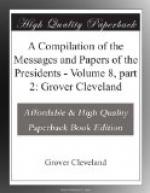The committee would commend to other portions of the country and to other cities this remarkable system, developed through the agency of both local and Federal authorities acting in harmony for an honest purpose. In no portion of the world and in no era of time where there has been an expression of the popular will through the forms of law has there been a more complete and thorough illustration of republican institutions. Whatever may have been the previous habit or conduct of elections in those cities, or howsoever they may conduct themselves in the future, this election of 1876 will stand as a monument of what good faith, honest endeavor, legal forms, and just authority may do for the protection of the electoral franchise.
This bill recognizes the authority and duty of the United States to appoint supervisors to guard and scrutinize the Congressional elections, but it denies to the Government of the United States all power to make its supervision effectual. The great body of the people of all parties want free and fair elections. They do not think that a free election means freedom from the wholesome restraints of law or that the place of election should be a sanctuary for lawlessness and crime. On the day of an election peace and good order are more necessary than on any other day of the year. On that day the humblest and feeblest citizens, the aged and the infirm, should be, and should have reason to feel that they are, safe in the exercise of their most responsible duty and their most sacred right as members of society—their duty and their right to vote. The constitutional authority to regulate the Congressional elections which belongs to the Government of the United States, and which it is necessary to exert to secure the right to vote to every citizen possessing the requisite qualifications, ought to be enforced by appropriate legislation. So far from public opinion in any part of the country favoring any relaxation of the authority of the Government in the protection of elections from violence and corruption, I believe it demands greater vigor both in the enactment and in the execution of the laws framed for that purpose. Any oppression, any partisan partiality, which experience may have shown in the working of existing laws may well engage the careful attention both of Congress and of the Executive, in their respective spheres of duty, for the correction of these mischiefs. As no Congressional elections occur until after the regular session of Congress will have been held, there seems to be no public exigency that would preclude a seasonable consideration at that session of any administrative details that might improve the present methods designed for the protection of all citizens in the complete and equal exercise of the right and power of the suffrage at such elections. But with my views, both of the constitutionality and of the value of the existing laws, I can not approve any measure for their repeal except in connection with the enactment of other legislation which may reasonably be expected to afford wiser and more efficient safeguards for free and honest Congressional elections.




